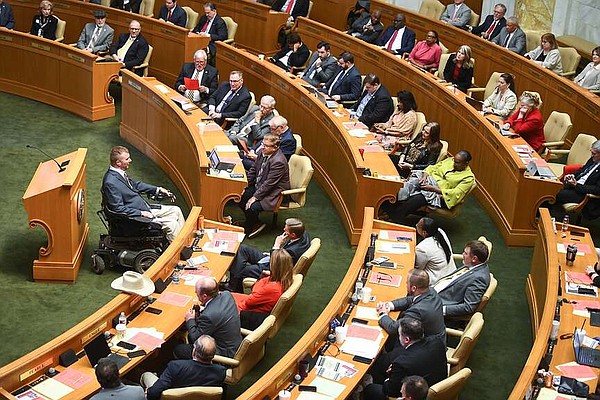Two bills designed to strengthen regulations on cryptocurrency mining in Arkansas are set to be introduced to the state House of Representatives next week. If approved by the chamber, the legislation could land on the desk of Gov. Sarah Huckabee Sanders by Wednesday, coming into effect immediately upon her endorsement.
Sen. Joshua Bryant of Rogers and Sen. Missy Irvin of Mountain View are the proponents of Senate Bill 78 and Senate Bill 79, respectively. These bills were put forward as nonappropriation bills during a fiscal session, requiring initial approval through resolutions backed by a two-thirds vote from both the Senate and House. The proposed regulations address various issues, including local governance over crypto mining regulation, noise concerns at facilities, and the ownership of crypto mines by specific foreign entities.
The genesis of these bills can be linked to the enactment of Act 851 of 2023, known as the Arkansas Data Centers Act. This act limited the authority of cities and counties to regulate crypto mines. Despite its smooth passage last year, the law faced opposition from several legislators, including Sen. Bryant, due to disruptive crypto mining operations cropping up across the state.
The bills gained considerable support in the Senate, with a 26-3 vote for Senate Bill 78 and a unanimous 32-0 vote for Senate Bill 79.
Both bills are scheduled for examination by the House Committee on City, County, and Local Affairs on Tuesday at 10 a.m. If approved, they will move to the full House for deliberation on Wednesday.
Senator Bryant expressed confidence, saying, “If all goes well, the governor will have her chance to review and sign it.”
With emergency provisions in place, the bills would be enforceable immediately upon Sanders’ approval. Existing crypto mining ventures would have a 90-day grace period to adhere to the new regulations once they are enacted. Additionally, any foreign-controlled business involved in crypto mining before the legislation takes effect would be given a year to divest its interests in such operations.
Senate Bill 78 requires crypto mining operations to implement noise mitigation measures, such as utilizing liquid cooling or enclosing the operational space. The bill allows for the use of a passively cooled, prefabricated container without full enclosure if the business relocates at least 2,000 feet away from the nearest residential or commercial structure or a designated industrial zone.
Individuals owning land within 2,000 feet of a crypto mining business could seek legal recourse in circuit court to enforce the noise reduction measures outlined in the bill.
On the other hand, Senate Bill 79 mandates that crypto mining enterprises secure a permit from the Oil and Gas Commission to operate. Senator Irvin highlighted that the bill establishes state regulatory oversight over crypto mining activities.
Both bills define a prohibited foreign party-controlled business as one in which the foreign entity holds an ownership stake exceeding zero percent. This prohibition includes individuals, entities, or governments subject to the International Traffic in Arms Regulations, which restrict arms trade with specific foreign entities.
The proposed legislation specifies that civil penalties and reparations obtained by the attorney general’s office concerning foreign-controlled businesses would be split between the state Oil and Gas Commission fund and the attorney general’s office.
Senator Bryant acknowledged concerns raised by House members regarding restrictions on foreign-owned enterprises and the potential extension of similar regulations to other industries. He stressed the importance of scrutinizing areas related to natural resources and the monetary system to protect American interests.
Bryant sees the introduced legislation as the initial phase of an ongoing dialogue likely to extend into the regular legislative session next year. He encouraged lawmakers to visit locally owned and operated crypto mining facilities in the state to witness a “free market, capitalistic approach” in action.
House Resolution 1009, sponsored by Rep. Rick McClure, which endorsed Bryant’s bill, passed with an 80-3 vote on April 17. Similarly, House Resolution 1020, sponsored by Rep. Jeremiah Moore, supporting Irvin’s bill, secured an 84-4 vote. However, six resolutions put forth by Rep. Josh Miller failed to meet the two-thirds threshold for approval in the House. These resolutions aimed to authorize Sen. Bryan King to propose bills imposing restrictions on crypto mining operations. Both King and Sen. Stephanie Flowers have expressed reservations about the scope of the impending bills, suggesting they may not go far enough in regulating the industry.
During the presentation of his resolutions, Miller expressed a desire to sidestep debates on the crypto mining sector and simply sought approval for the resolutions. He underscored the importance of doing what is right, regardless of the parties involved.

